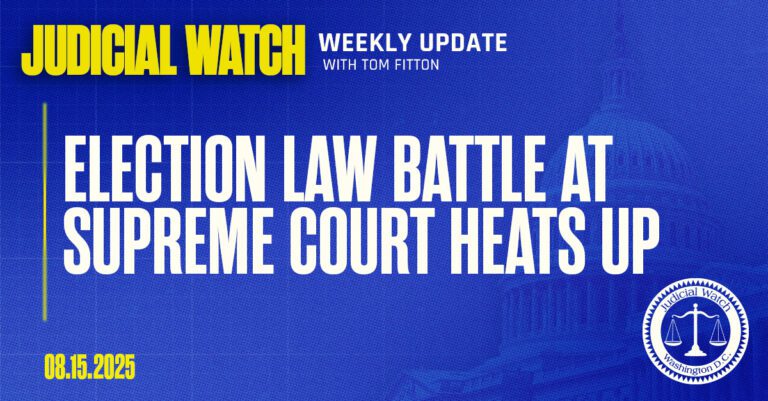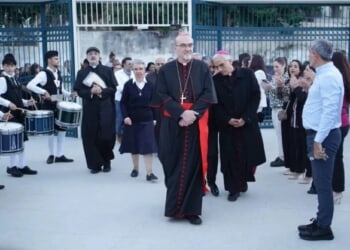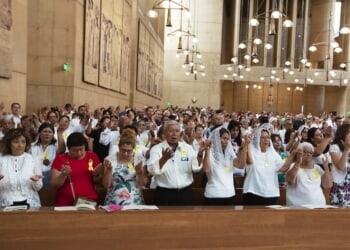Tom Fitton’s Judicial Watch Weekly Update
|
August 15, 2025

Supreme Court Sets Argument on Illinois’ Post–Election Ballot Counting
Judicial Watch Urges Supreme Court to Preserve Respect for Election Day
Dozens of Prisoners Released from Gitmo Reengaging in Terrorist Activities
Supreme Court Sets Argument on Illinois’ Post–Election Ballot Counting
Our fight for the rule of law in elections is moving forward at the U.S. Supreme Court.
The Supreme Court just scheduled oral argument for October 8, 2025, in our lawsuit on behalf of Congressman Mike Bost and two presidential electors, who are before the court to vindicate their standing to challenge an Illinois law extending ballot counting for 14 days beyond the date established by federal law.
On July 22, we announced that we filed our opening brief to the Supreme Court in this case (Rep. Michael J. Bost, Laura Pollastrini, and Susan Sweeney v. The Illinois State Board of Elections and Bernadette Matthews (No. 1:22-cv-02754, 23-2644, 24-568)).
In June, the Supreme Court agreed to hear our appeal of the decision of the U.S. Court of Appeals for the Seventh Circuit in this case. The lower courts had denied that Bost and the electors had standing to challenge Illinois’ practice of counting ballots received up to 14 days after Election Day. The Election Day lawsuit was initially filed on May 25, 2022.
Our Supreme Court brief states:
Federal law sets the first Tuesday after the first Monday in November as the federal Election Day.
***
Candidates have an obvious interest in the lawfulness and fairness of the rules that govern the elections into which they pour their time and resources. They also have an obvious interest “in ensuring that the final vote tally accurately reflects the legally valid votes cast.”
***
Candidates pour enormous resources into running for election and have an obvious interest in the rules that dictate how long their races will last and how the ballots will be counted. They also have a distinct interest “in ensuring that the final vote tally accurately reflects the legally valid votes cast.”
This is a historic election law challenge. Too many courts have denied candidates their right to challenge unlawful election rules such as the outrageous act of counting ballots that arrive AFTER Election Day. American citizens concerned about election integrity will tune in closely to Judicial Watch’s Supreme Court arguments on October 8.
As you know, we are a national leader in voting integrity and voting rights. As part of its work, Judicial Watch assembled a team of highly experienced voting rights attorneys who stopped discriminatory elections in Hawaii, and cleaned up voter rolls across the country, among other achievements.
Robert Popper, a Judicial Watch senior attorney, leads its election law program. Popper was previously in the Voting Section of the Civil Rights Division of the Justice Department, where he managed voting rights investigations, litigations, consent decrees, and settlements in dozens of states.
Paul Clement, who has argued more than 100 cases before the Supreme Court, is representing Congressman Bost and the electors with us before the Supreme Court. Clement is former solicitor general under President George W. Bush from 2005-2008 and is widely regarded as among the top Supreme Court litigators in the country.
Russell Nobile, a Judicial Watch senior attorney, is part of our voting integrity efforts and focuses on campaign and voting issues, civil rights issues, constitutional law, official misconduct by public institutions and officials, and other issues.
Eric Lee is an attorney at Judicial Watch, where he focuses on enforcing federal and state laws that promote transparency and integrity in the electoral process. Eric graduated with his B.A. from St. Mary’s College of Maryland and received his J.D. from the University of Maryland School of Law. He is licensed to practice in California, Maryland, the District of Columbia, and in federal courts in Illinois and Colorado.
We recently filed a brief to the U.S. Supreme Court on behalf of the Libertarian Party of Mississippi, opposing the State of Mississippi’s attempt to overturn the U.S. Court of Appeals for the Fifth Circuit’s decision, which struck down a law allowing ballots received after Election Day to be counted
Federal courts for Oregon, California and Illinois have ruled that our lawsuits may proceed against those states to force them to clean their voter rolls.
We announced in May that our work led to the removal of more than five million ineligible names from voter rolls nationwide.
Judicial Watch Urges Supreme Court to Preserve Respect for Election Day
The Supreme Court is now considering whether to take up a challenge to Judicial Watch’s historic victory essentially outlawing the counting of ballots received after Election Day in several states. On behalf of the Libertarian Party of Mississippi, we filed a brief with the U.S. Supreme Court opposing the State of Mississippi’s attempt to overturn the U.S. Court of Appeals for the Fifth Circuit’s decision striking down a law allowing the counting of ballots received after Election Day (Michael Watson, Mississippi Secretary of State v. Republican National Committee, et al.,(No. 24-1260)).
The October 25, 2024, Fifth Circuit appellate opinion found:
Congress statutorily designated a singular “day for the election” of members of Congress and the appointment of presidential electors. Text, precedent, and historical practice confirm this “day for the election” is the day by which ballots must be both cast by voters and received by state officials. Because Mississippi’s statute allows ballot receipt up to five days after the federal election day, it is preempted by federal law. We reverse the district court’s contrary judgment and remand for further proceedings.
Our brief argues that the Supreme Court should refuse to review the Fifth Circuit ruling:
[T]he Court of Appeals correctly applied existing Court precedent to find that the Receipt Deadline is inconsistent and conflicts with the Election Day statutes, and is preempted by them. Petitioner [MS secretary of state] has not demonstrated any reason why the Court’s intervention is needed now. Modification of the Election Day receipt deadline allows states to “engage in gamesmanship, experiment with deadlines, and renew the very ills Congress sought to eliminate: fraud, uncertainty, and delay.”
We initially filed the civil rights lawsuit in February 2024 on behalf of the Libertarian Party of Mississippi, challenging the same Mississippi election law permitting absentee ballots to be received as long as five business days after Election Day. The suit was consolidated with one filed by the Republican National Committee, the Mississippi Republican Party, and other complainants.
In March 2025, the Fifth Circuit declined to rehear its previous ruling, in which it agreed with Judicial Watch that it was unlawful for Mississippi to count ballots that arrived after Election Day. The full Circuit declined to hear the case by a vote of 5 to 10.
Our brief recounts:
In reversing the district court on the merits, the [Fifth Circuit] panel faithfully followed this Court’s precedent … [T]his Court found that the Election Day statutes preempted a Louisiana law that allowed congressional candidates to be elected in October…. In interpreting the meaning of “day of the election” within the Election Day statutes, this Court found that “[w]hen the federal statutes speak of ‘the election’ of a Senator or Representative, they plainly refer to the combined actions of voters and officials meant to make a final selection of an officeholder.” … Accordingly, the “day of the election” “may not be consummated prior to federal election day.”
On July 22, we filed our opening brief to the Supreme Court in a case filed on behalf of Congressman Mike Bost and two presidential electors, who are before the court to vindicate their standing to challenge an Illinois law extending Election Day for 14 days beyond the date established by federal law (Rep. Michael J. Bost, Laura Pollastrini, and Susan Sweeney v. The Illinois State Board of Elections and Bernadette Matthews (No. 1:22-cv-02754, 23-2644, 24-568)). Initially filed in May 2022, this was the first challenge seeking to require all ballots be received by Election Day.
In March 2025, we filed a federal lawsuit against California on behalf of U.S. Rep. Darrell Issa to prevent state election officials from extending Election Day for seven days beyond the date established by federal law. California counts ballots received up to seven days after Election Day (Darrell Issa v. Shirley N. Weber, in her official capacity (No. 3:25-cv-00598)).
Counting ballots received after Election Day is a flagrant violation of federal law and encourages fraud and voter distrust. Let us hope that the Supreme Court will decline to hear Mississippi’s senseless attempt to overturn a historic decision that sensibly concluded that counting ballots received after Election Day is unlawful.
Dozens of Prisoners Released from Gitmo Reengaging in Terrorist Activities
Once a terrorist, always a terrorist? It seems that way, and yet leftists in our government keep releasing terrorists who go right back to terrorism, our Corruption Chronicles blog reports:
Over a decade after the U.S. government offered a $5 million reward for information on the whereabouts of an Al Qaeda operative it released from the military prison at Guantanamo Bay (“Gitmo”) an intelligence report reveals that, like him, dozens of detainees freed from the compound have rejoined terrorist missions. They are part of the hundreds of Gitmo terrorists discharged over the years under a controversial program that started with President George W. Bush and continued full throttle under the Obama administration. Numerous military and intelligence reports have for years documented that many of the captives return to terrorism after leaving the top security prison at the Naval station in southeast Cuba.
As far back as 2010 Obama’s National Intelligence Director disclosed that one in four men incarcerated at Gitmo resume terrorist activities against the United States after being released even as the former president worked to fulfill his promise of returning America to the “moral high ground” by closing the detention facility. At the time 150 former Gitmo prisoners were confirmed or suspected of “reengaging in terrorist or insurgent activities after transfer,” the then Director of National Intelligence (DNI) told Congress. At least 83 “remain at large” and if additional detainees are released, some will “reengage in terrorist or insurgent activities,” the 2010 DNI assessment stated. Years earlier the Pentagon’s Defense Intelligence Agency (DIA) had acknowledged a sharp rise in the number of Gitmo detainees who rejoin terrorist missions after leaving U.S. custody. Using data such as fingerprints, pictures, and other reports the defense agency, which gathers foreign military intelligence, determined that the number of Middle Eastern terrorists who returned to “the fight” after discharge from Gitmo nearly doubled in a short time.
All these years later, as some Democrats and their leftist allies insist on closing the prison, the recidivism issue persists. The facility still houses the world’s most dangerous Islamic terrorists, including 9/11 masterminds Khalid Sheikh Mohammed (KSM), Ramzi Binalshibh, Ali Abdul Aziz Ali, and Mustafa Ahmed Adam al Hawsawi as well as USS Cole bomber Abd al-Rahim al-Nashiri. But many dangerous, once classified “forever” prisoners, have been let go and present a grave national security threat. The Al Qaeda operative, Ibrahim al-Rubaysh, that the government offered a multi-million-dollar reward for after the Gitmo release is a senior Sharia official and advisorof the terrorist organization, according to the State Department. Other examples of recidivism among freed Gitmo jihadists include dozens who have rejoined Al Qaeda in Yemen, the country where the 2009 Christmas Day airline bomber proudly trained, and several high-ranking Al Qaeda militants in Yemen involved in a sophisticated scheme to send bombs on a U.S.-bound cargo plane. A Gitmo alum named Mullah Abdul Rauf, who once led a Taliban unit, established the first Islamic State in Iraq and Syria (ISIS) base in Afghanistan. Another, Sabir Mahfouz Lahmar, was arrested in France as part of a terrorist cell that operated an ISIS recruiting network.
The latest report issued by the Office of the Director of National Intelligence (ODNI) reveals that of 739 prisoners released from Gitmo, 137 are “confirmed of reengaging” in terrorist activities and 97 are suspected of doing so, which means they likely are. “Based on trends identified during the past 20 years, we assess that some detainees currently at GTMO will seek to reengage in terrorist or insurgent activities after they are transferred,” the recently declassified ODNI document states. “Transfers to countries with ongoing conflicts and internal instability as well as recruitment by terrorist or insurgent organizations could pose an increased risk of reengagement.” The ODNI further reveals that former Gitmo detainees routinely communicate with each other, families of former detainees and members of terrorist organizations. Intelligence officials have determined that planning terrorist operations is among the reasons for the communication.
The Biden administration released the latest batch of terrorists from Gitmo, 11 Yemenis transferred to Oman in early January. There are currently 15 of the world’s most dangerous jihadists at the military prison that once incarcerated 779. For years Judicial Watch has traveled to Gitmo to observe and report on the military tribunal trials of 9/11 terrorists and others, including USS Cole bomber al-Nashiri. Judicial Watch also covers all the hearings held by the Obama-created parole panel known as the Periodic Review Board via satellite video feed at the Pentagon.
Until next week,





![Gavin Newsom Threatens to 'Punch These Sons of B*thces in the Mouth' [WATCH]](https://www.right2024.com/wp-content/uploads/2025/08/Gavin-Newsom-Threatens-to-Punch-These-Sons-of-Bthces-in-350x250.jpg)
![ICE Arrests Illegal Alien Influencer During Her Livestream in Los Angeles: ‘You Bet We Did’ [WATCH]](https://www.right2024.com/wp-content/uploads/2025/08/ICE-Arrests-Illegal-Alien-Influencer-During-Her-Livestream-in-Los-350x250.jpg)








